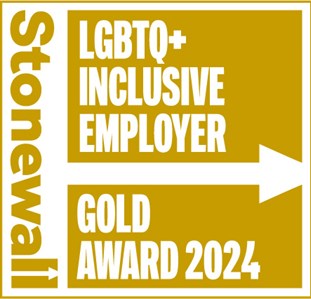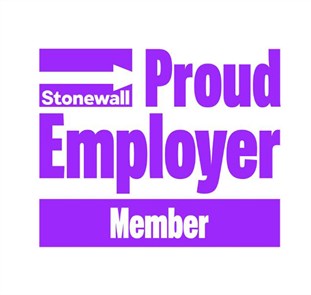Stonewall
Stonewall is the largest lesbian, gay, bisexual and transgender (LGBT+) rights charity in Europe.
Stonewall Proud Employers programme
The university is a proud member of Stonewall’s Proud Employers programme (formerly called the Diversity Champions programme). The programme supports and promotes fair practice in relation to the employment of lesbian, gay, bisexual and transgender staff, and our role as a Stonewall Proud Employer is integral to our commitment to equality for LGBTQ+ staff and students.
Like Stonewall, we know that people perform better when they can be themselves. By being a Stonewall Proud Employer, we are taking action as part of Britain’s leading employers’ programme for LGBTQ+ people to ensure that all lesbian, gay, bi and trans staff are accepted without exception in the workplace.
Workplace Equality Index
Between 2005 and 2025 Stonewall ran the Workplace Equality Index (WEI) which was the UK’s leading benchmarking tool for LGBTQ+ inclusion in the workplace. The WEI enabled employers to assess and improve their LGBTQ+ inclusion practices across key areas including employment policy and practice, training and community engagement. This was used alongside the results of an anonymous staff survey to determine ranking. The university applied to the index in 2019 ranking at number 72 in the list of top 100 employers and more recently in 2024 where we placed at number 14.


Our progress
The university’s LGBTQ+ Equality Champion is Julie Fryatt, Director of People, who represents concerns relating to lesbian, gay, bisexual and transgender equality at the University Executive Board.
Following the 2024 results of the Workplace Equality Index where the university ranked at 14 out the top 100 employers, the university will be using feedback from Stonewall to inform a new LGBTQ+ action plan, which will build on and enhance work which is currently being done to support LGBTQ+ inclusion across the university.
Our ambition
Ensuring equality for our lesbian, gay, bisexual and transgender staff is a key priority for the university. Our commitment is high profile and we actively support a number of campaigns across the city as part of this work. As part of our commitment to achieving LGBTQ+ equality, the university aimed to rank within the Stonewall Workplace Equality Index Top 100 by 2020–21 and exceeded this goal by being placed 72nd in the 2019 WEI and reaching 14 in 2024.
The LGBTQ+ Action Plan Group will continue to oversee our LGBTQ+ equality work and our institutional action plan will be updated to reflect feedback from Stonewall on areas where progress is needed to achieve best practice. Action plans for our Stonewall WEI and LGBTQ+ equality work will be published here as they become available.